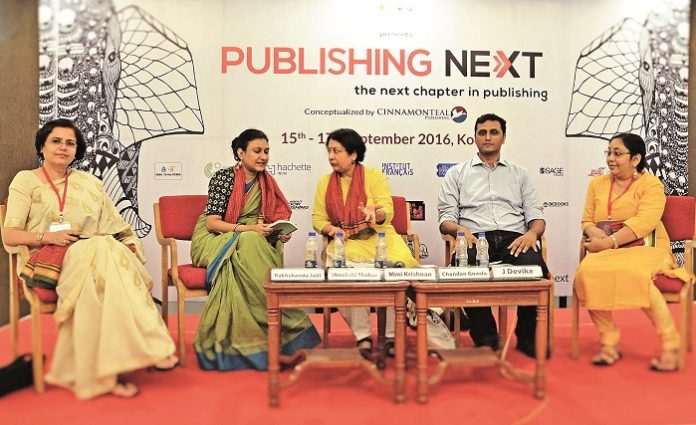
The Publishing Next Conference is a unique event that brings together not only English and Indian language publishers but also publishing aspirants and self-publishers on a single platform. Authors, translators, designers, illustrators, distributors, retailers, eBook developers and service providers are all part of the stakeholders as are readers interested in the book trade. Leonard Fernandes, organizer of the Publishing Next Conference and chief executive officer of Cinnamonteal Publishing, based in Goa, says that although the conference was first conceived to discuss the future of publishing, “we were not even aware of the present. It is important to get people together on the same page”.
Over the years Publishing Next has earned a reputation for its efforts towards capturing trends, and building awareness about new technologies and business practices in printing and publishing. These have been useful for large and small publishers alike. This year, too, a number of small publishers, many of them publishing in Indian languages, attended the conference.
The seventh edition of Publishing Next conference was held from 15 to 17 September 2016 at the Bolgatty Palace and Island Resort in Kochi, Kerala. One of the highlights of this year’s conference was the Publishing Next Industry Awards, which were presented in seven categories. The agenda also covered several topics with special focus on translations in Indian languages, trends that are seen in the publishing business today, such as advances in dissemination of higher education content and technologies that impact publishing.
Awards
The Publishing Next Industry Awards, instituted in 2014, were presented in seven categories this year. Awards were presented for the Printed Book of the Year, which was bagged by Narratives for Indian Modernity: The Aesthetic of Brij Mohan Anand; the Printed Children’s Book of the Year award went to Book of Beasts: An A to Z Rhyming Bestiary; Digital Book of the Year went to Jadav and the Tree-Place; Book Cover of the Year went to Kalkatta; Printed Book of the Year (Indian languages) went to Hoshiarpur Aur Anya Kavitayein; Bookstore of the Year went to Walking Bookfairs, Bhuvaneshwar; and Publisher of the Year went to Yoda Press.
Masterclasses
The first day of the conference was reserved for Masterclasses, which were introduced to cater to the needs of publishers and authors, who had, during past conferences, requested longer workshop-like sessions to help them understand specific areas of publishing. Four such masterclasses were held, each spanning three hours—Publishing 101 conducted by Ritu Menon, founder of Women Unlimited on the publishing process for the audience; After Writing, What Next? conducted by Jayapriya Vasudevan in which she urged the need to write well and pitch appropriately; and the Mechanics of Editing conducted by Esha Beteille, publisher, Social Science Press, who attended to the requirements of both authors and publishers. The masterclasses addressed the role of the commissioning and copy editor, the importance of retaining the author’s tone and voice, and provided them with examples of how different types of texts ought to be edited. Manasi Subramaniam, commissioning editor and rights manager at HarperCollins India, conducted a session on ‘Understanding Copyright and the Rights Trade’ in which she explained the various types of rights that are sold and underlined the importance of a well-developed catalog, and the processes and contracts inherent to trading of rights.
The sessions on Day 2 included workshops, panel discussions, conversations and a specially curated networking session. In the first panel discussion of the day, titled ‘Translations: Market and Profession,’ the speakers underlined the need for publishers to be more proactive about the texts that were being translated. The concern among certain quarters that many translations did not prove good returns on investment was voiced during the discussion. The need to publish translations that, for instance, developed a new school of thought in sociology that was grounded in Indian texts and philosophy, and balance that with the publishers’ need to receive an appropriate return on investment was discussed.
The highlight of the third day was the session ‘Where Must We Invest Next?’ during which the speakers tried to pinpoint one or two key areas of focus that would help publishers grow their businesses. Sriram Subramanya, founder, managing director and chief executive officer, Integra Software Services spoke on the advances in digital publishing and publishing workflow models that have helped publishers become more efficient. Although these models were yet to find ground in India, he hoped that they would soon be adopted here. Sesh Seshadri, director and general manager, Lonely Planet India and managing partner, Overleaf Books LLP, while asking the audience to embrace technology and use it to their advantage, advocated the need to develop a common marketplace for Indian language books.
Chief guest A Sethumadhavan, Sahitya Akademi Award winning author and ex-chairman, NBT, India, spoke on the need to encourage reading among everyone in the country. He illustrated the example of libraries in Kerala that encourage reading habits even in far-flung areas of the state.
Speaking to Indian Printer & Publisher, Fernandes says, “I think we have established the conference as an important event in the calendar of every publishing professional in the country. People have now understood the value of the conference, especially through its various programmes and through the fact that you get to meet publishers from all over the country. However, it is not easy to establish a forum for transparent discussion of day-to-day publishing issues such as Indian languages, distribution and author royalties.”
“I feel that the conference is shaping well. We are getting an idea of the kind of sessions that participants want and the structure is slowly falling in place. That said, we are always experimenting with different formats. I feel the conference was a success although this is a question that needs to be put up to the participants. We had a large number of new participants and, judging by the response, they were happy with the sessions we had organized. There have also been requests to have the conference in other cities,” Fernandes says.
On the issue of sponsorship, Fernandes feels, “Although we have a small budget, we are unable to raise enough money to continue in a sustainable manner. We are also unable to reach many publishers, sometimes because they are simply difficult to reach out to. I sincerely hope that the conference will continue to grow as one of the premier publishers’ conference in South Asia.”

















